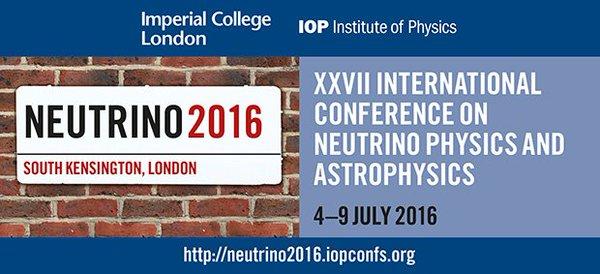Neutrino 2016: The largest international neutrino conference set to arrive in London

From July 4-9 hundreds of physicists wil be coming to South Kensington to share and discuss the latest in neutrino research. The INTERNATIONAL CONFERENCE ON NEUTRINO PHYSICS AND ASTROPHYSICS, is coming to London hosted by the Institute of Physics and Imperial College London. The conference, held at the Royal Geographical Society in South Kensington, will bring together physicists from around the world to discuss the latest theories and findings in neutrino physics and astrophysics.
The conference will gather 700 delegates to review current neutrino research, the impact of neutrino physics on astronomy and cosmology and the vision for the future development of these fields.
Neutrinos are subatomic particles that tell physicists a lot about the sun, supernovae and the universe. These small, almost weightless particles are produced through the interactions of the fundamental constituents of matter – nuclear power plants here on Earth, the reactions that generate the Sun’s energy, and the processes by which stars are created and destroyed.
The study of the neutrino is set to reveal a deeper understanding of the fundamental nature of the building blocks of matter and will allow physicists to learn more about extreme astrophysical events that have taken place in the history of our universe, such as the explosions of supernovae.
The week–long event will commence with talks from esteemed Nobel Laureates Takaaki Kajita and Arthur B McDonald. Both received the 2015 Nobel Prize in Physics for discovering that neutrinos have mass and in doing so, turning one of the most established physics theories, the Standard Model, on its head.
The launch will then be followed by five packed days of seminars and poster sessions, with the conference being the perfect opportunity for leading researchers to share their latest findings.
New datasets from some of the biggest neutrino experiments will also be revealed. These include the most up-to-date information from the NOvA, T2K and OPERA experiments on how neutrinos change flavour, and the latest results from Daya Bay and RENO, which are currently observing neutrinos from nuclear reactors.
New information from the Super-Kamiokande and IceCube detectors will also be presented – results that will help to find out more about how stars explode and cool.
There will also be sessions exploring the use of neutrinos to understand the universe and the fundamental properties of nature, the future of neutrino research, whether neutrinos could help us finally to detect dark matter and much more from this exciting and fast-paced field of physics. The properties of the neutrino itself will also be discussed, with new data from experiments searching for evidence that the neutrino is its own antiparticle being presented.
An interactive exhibit about the work of Dr. Art McDonald at the Sudbury Neutrino Observatory and the current experiments at SNOLAB will be on at Canada House on Trafalgar Square.
Professor Kenneth Long, co-chair of the Local Organising Committee of the conference, said of the event: “It is wonderful to be able to welcome so many friends and colleagues from around the world to South Kensington to celebrate the achievements that led to the award of the 2015 Nobel Prize in Physics to Professors Kajita and McDonald and the award of the Breakthrough Prize to the collaborations that made such seminal discoveries.
“Historically, the study of the neutrino has played a critical role in establishing the standard model of particle physics… and in demonstrating that it is incomplete. Neutrino 2016 may prove to be a turning point, with new results expected from across the field, new experimental programmes being established and an exciting emphasis on what neutrinos have to teach us about the universe.”
You can read the full programme of the event here and abstracts of each of the sessions online.
For More Information:
Philippa Skett
Media Officer
Institute of Physics
76 Portland Place, London W1B 1NT
E-mail: philippa.skett@iop.org
Direct tel: +44 (0) 20 7470 4829
Mobile: +44 (0)788 0525 0792